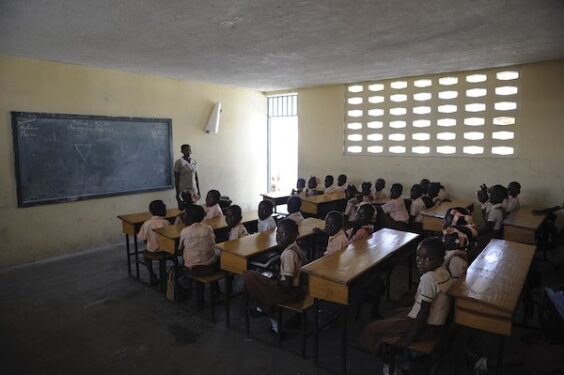PROSPECT PARK — A priest living in a suburb of Port-Au-Prince, Haiti, says armed gangs have taken control of 30% to 40% of the capital city and its surrounding suburbs, which has coincided with a surge of violence and crime.

The priest, who spoke on the condition of anonymity out of fear for his safety, lives near the center of Port-au-Prince. The area is densely populated, extremely impoverished — and riddled with gang activity.
“It’s dangerous.” the priest stressed. “They just make war to control more places because if they control the place, they can control the election, and decide who wins the race.”
One gang in particular, the 400 Mawozo, has secured a stronghold in the areas northeast of Port-au-Prince and has become notorious for violence and kidnappings this year. Its name loosely translates to 400 “inexperienced men.”
The group made global headlines in April when it kidnapped five Catholic priests, two Catholic nuns, and three relatives, initially demanding a million-dollar ransom. The captives were later released, though it’s still unclear whether or not the ransom was paid.
In that situation, the Haitian priest told The Tablet that to his knowledge the captives “were respected” and given food and other necessities. The captors’ goal, he said, was to make a deal with people to receive money.
According to the Associated Press, about a year ago Haitian police issued a wanted poster for Wilson Joseph, the alleged leader of 400 Mawozo; charges included murder, attempted murder, auto theft, hijacking of goods, and kidnapping.
The gang was back in the headlines last week. On Oct. 16, it carried out another mass kidnapping of 17 people — six men, six women, and five children — associated with an Ohio-based missionary group founded by the Amish and Mennonites. It was reported on Oct. 19 that the kidnappers were demanding a $17 million ransom for the captives’ release.
The 17 people — 16 Americans and one Canadian — were abducted between Titanyen, north of Haiti’s capital city Port-au-Prince, and the Croix des Bouquets area, where they had spent the day visiting an orphanage.
“My first reaction when I heard about this was, they are crazy to come with women and children. It’s too dangerous in Haiti,” the anonymous source said, adding that he “never goes to this place where they were kidnapped” because of the danger.
The abduction has garnered international attention and front page news because of its scale and the brazen act of kidnapping American missionaries. However, kidnappings in general have been a problem in Haiti all year.
From January to September 2021, at least 628 kidnappings were recorded, according to data from the Center for Analysis and Research in Human Rights (CARDH), a non-profit based in Port-au-Prince. CARDH also found kidnappings have increased in recent months. Its data shows there were at least 221 kidnappings between July and September, with 31, 73 and 117 respectively, an increase of nearly 300%.
Security has worsened and violence has risen in Haiti in recent months due to the nation’s political disorder, which has increased since President Jovenel Moïse was assassinated in July. The turmoil has led to the surge of gangs.
Msgr. Pierre-André Pierre, who leads the National Haitian Apostolate in the U.S., told The Tablet he is in constant contact with Catholics in Haiti, who describe a dire situation with the gangs in control.
“It’s really difficult for people to move around, for children to go to school, for people to go to their usual occupations,” Msgr. Pierre said. “It’s a tragedy what is going on at this time in the country.”
Archbishop Thomas Wenski of Miami told The Tablet he spoke with the Haitian bishops on Oct. 13 via a Zoom conversation; he was told they’re looking to move students and faculty out of a seminary in the area where the 17 people were kidnapped “because the security situation in that area has degenerated to such an extent because of the 400 Mawozo gang.”
Archbishop Wenski has long been an advocate and ally to Haitians, and has played a key role as the U.S. Conference of Catholic Bishops (UCCB) representative to PROCHE, the Partnership for the Reconstruction of the Church in Haiti. He said this is the “worst Haiti has been for a long time.”
“You think once it hits bottom it would start going on the uptick, but every time we think we hit bottom we find out that bottom is even deeper,” Archbishop Wenski said. “From every angle – health-wise, economic-wise, political-wise, social-wise – all of the indicators are very alarming. It’s a great humanitarian crisis.”
